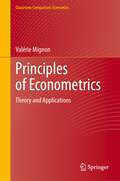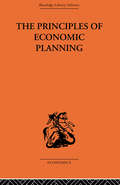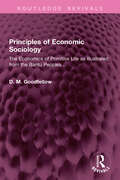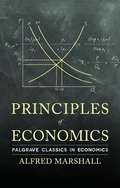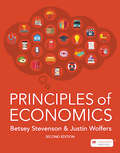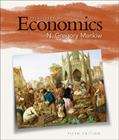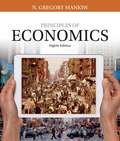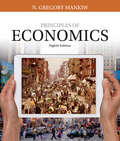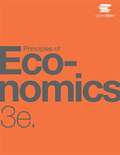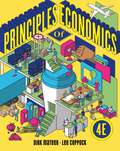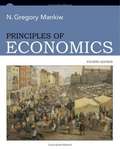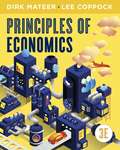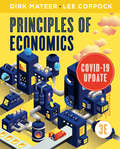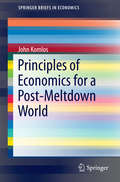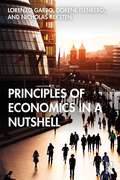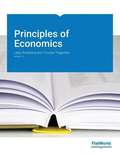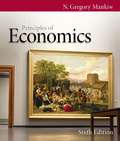- Table View
- List View
Principles of Econometrics: Theory and Applications (Classroom Companion: Economics)
by Valérie MignonThis textbook teaches the basics of econometrics and focuses on the acquisition of methods and skills that are essential for any student to succeed in their studies, as well as for any practitioner interested in applying econometric techniques. Employing a pedagogical and easy-to-follow style, the book puts into practice the various concepts presented, such as statistics, tests, and methods, among others. Numerous examples and empirical applications using existing econometric and statistical software are given after each theoretical presentation.The book addresses students at the undergraduate and graduate levels in economics and management, as well as students of engineering and business schools. It will further appeal to professionals and practitioners of econometrics, such as economists and researchers in companies and institutions, who will find practical solutions to the different problems they are confronted with.
Principles of Economic Planning: A Study Prepared For The Fabian Society (Unwin University Book Ser. #Vol. 11)
by W. Arthur LewisDiscussing the problems arising from a mixed economy, Principles of Economic Planning argues for a system of controls that combine and encourage the best features of laissez faire and state planning. Chapters covering the following are included:* Money* Investment* Foreign Trade* Mobility* The Social Control of Business* NationalizationAppendices on economic union and planning in developing countries are also included.
Principles of Economic Sociology: The Economics of Primitive Life as Illustrated from the Bantu Peoples... (Routledge Revivals)
by D. M. GoodfellowFirst published in 1939, Principles of Economic Sociology has a two-fold object: first, to develop an economic theory of primitive life, secondly, to show the social principles behind the making of economic decisions, whether among primitive or advanced peoples. Economic theory was first developed with regard to Western exchange economics. Since then, it has been explored among the activities of totalitarian states. Here the process is carried a step further, by tracing economic theory in the lives of primitive peoples. It shows how the Bantu of Africa make economic choices, dispose of their resources, and apply capital to the meeting of future needs, always in a manner dictated by their own culture, yet fundamentally on principles similar to those of advanced peoples.The importance of groups in the making of economic decisions is stressed. Economics is enriched by a study of the structure of groups, since this plays a fundamental part in the forming of decisions. The author hopes that his work will encourage economists to use a knowledge of primitive peoples to test their theories and help to coordinate the two major branches of social science, economics and sociology. This is an important historical reference work for scholars of African economics, economic sociology, and economic history.
Principles of Economics
by Alfred MarshallPublished in 1890 after nearly ten years of research, this magisterial opus, intended to offer a kind of Grand Unified Theory of Economics for its time--a planned second volume never appeared--was immensely influential due to its innovative treatment of such concepts as elasticity of demand, consumer surplus, and marginal utility.
Principles of Economics
by Betsey Stevenson Justin WolfersStevenson/Wolfers is built around the idea that ‘every decision is an economic decision’. It is the perfect choice for Principles of Economics courses and for economics majors and nonmajors alike.
Principles of Economics
by Libby Rittenberg Timothy TregarthenToday we are excited to introduce Libby Rittenberg and Timothy Tregarthen’s Principles of Economics. The authors teach economics as the study of “choice “ by providing students with an accessible, straightforward overview of economics. This text combines the clarity and writing of Tregarthen's seminal periodical "The Margin" with great teaching insights. Rittenberg and Tregarthen help students to understand how real individuals actually work with economics. In this new book, the authors illustrate the practicality and relevance of economics with a variety of new illustrations and insights. The authors take a three-pronged approach to every concept: (1) the concept is covered with a “Heads Up” to ward off confusion, (2) a “You Try It” section makes sure students are staying on top of the concept and (3) a “Case and Point” section that uses a real-world application to harness the concept in reality. For one example of how this plays out in the text see "Chapter 3, Section 2 on Supply."
Principles of Economics
by N. Gregory MankiwPRINCIPLES OF ECONOMICS continues to be the most popular and widely used text in economics classrooms today. The fifth edition features a strong revision of content in all 36 chapters while maintaining the clear, accessible writing style and precise presentation that are the hallmark of this highly respected author. Dozens of new applications emphasize the real-world relevance of economics for today's students through interesting news articles, realistic case studies, and engaging problems. The new edition also features an expanded instructor's resource package designed to assist in course planning and classroom presentation, as well as full integration of content with Aplia. "I have tried to put myself in the position of someone seeing economics for the first time. My goal is to emphasize the material that students should and do find interesting about the study of the economy. "--N. Gregory Mankiw.
Principles of Economics
by N. Gregory Mankiw<P>"Economics is a study of mankind in the ordinary business of life." So wrote Alfred Marshall, the great 19th-century economist, in his textbook, Principles of Economics.<P> We have learned much about the economy since Marshall's time, but this definition of economics is as true today as it was in 1890, when the first edition of his text was published.<P> Why should you, as a student in the 21st century, embark on the study of economics? <P>There are three reasons. <P>The first reason to study economics is that it will help you understand the world in which you live. There are many questions about the economy that might spark your curiosity.<P> Why are apartments so hard to find in New York City?<P> Why do airlines charge less for a round-trip ticket if the traveler stays over a Saturday night? <P>Why is Robert Downey, Jr., paid so much to star in movies? <P>Why are living standards so meager in many African countries? <P>Why do some countries have high rates of inflation while others have stable prices? Why are jobs easy to find in some years and hard to find in others? <P>These are just a few of the questions that a course in economics will help you answer.
Principles of Economics
by N. Gregory MankiwPRINCIPLES OF ECONOMICS, 8E. With its clear and engaging writing style, this book emphasizes only the material that will help you better understand the world in which you live, will make you a more astute participant in the economy, and will give you a better understanding of both the potential and limits of economic policy. The latest relevant economic examples bring principles to life. Acclaimed text author N. Gregory Mankiw explains, "I have tried to put myself in the position of someone seeing economics for the first time. My goal is to emphasize the material that students should and do find interesting about the study of the economy." Powerful student-focused digital resources are available in leading MindTap and Aplia digital learning and homework solutions that reinforce the principles presented in this edition.
Principles of Economics
by OpenStaxPrinciples of Economics covers the scope and sequence for a two-semester principles of economics course. The text also includes many current examples, including; discussions on the great recession, the controversy among economists over the Affordable Care Act (Obamacare), the recent government shutdown, and the appointment of the United States’ first female Federal Reserve chair, Janet Yellen. The pedagogical choices, chapter arrangements, and learning objective fulfillment were developed and vetted with feedback from educators dedicated to the project. The outcome is a balanced approach to micro and macro economics, to both Keynesian and classical views, and to the theory and application of economics concepts. Current events are treated in a politically-balanced way, as well.
Principles of Economics
by OpenStaxPrinciples of Economics 3e covers the scope and sequence of most introductory economics courses. The third edition takes a balanced approach to the theory and application of economics concepts. The text uses conversational language and ample illustrations to explore economic theories, and provides a wide array of examples using both fictional and real-world scenarios. The third edition has been carefully and thoroughly updated to reflect current data and understanding, as well as to provide a deeper background in diverse contributors and their impacts on economic thought and analysis. For example, the third edition highlights the research and views of a broader group of economists. Brief references and deeply explored socio-political examples have been updated to showcase the critical – and sometimes unnoticed – ties between economic developments and topics relevant to students. This is the official print version of this OpenStax textbook. OpenStax makes full-color hardcover and B&W paperback print copies available for students who prefer a hardcopy textbook to go with the free digital version of this OpenStax title. The textbook content is exactly the same as the OpenStax digital book. This textbook is available for free download at the OpenStax dot org website, but as many students prefer to study with hardcopy books, we offer affordable OpenStax textbooks for sale through Amazon as well as most campus bookstores.
Principles of Economics (3rd edition)
by N. Gregory MankiwDesigned for a two-semester introductory course in economics, this textbook covers micro- and macro-economics. After dealing with the basic tools of supply and demand, Mankiw looks at government intervention in market allocations, firm and industrial organization behavior, labor markets, the behavior of the real economy over the long run, and the macroeconomics of open economies, and short run fluctuations within long run trends. Similarly to many textbooks on economics and many other subjects, there is little acknowledgment of controversy within the field.
Principles of Economics (8th edition)
by Ray C. Fair Karl E. CaseAn introductory college economics textbook. Case and Fair (Wellesley and Yale) focus on the key concepts.
Principles of Economics (Fourth Edition)
by Dirk Mateer Lee CoppockMateer and Coppock Make Economics for Everyone Drawing on their extensive teaching experience in the classroom and online, Mateer and Coppock continuously innovate to address the changing teaching and learning challenges faced by instructors and students. The Fourth Edition introduces new scaffolded learning pedagogy with a Norton Illumine Ebook as well as revised InQuizitive and Smartwork activities that provide personalized support and build problem-solving skills. New relevant and relatable examples ensure that students understand how their lives are influenced by economics, and rich Norton Teaching Tools resources help instructors connect with students before, during, and after class. This purchase offers access to the digital ebook only.
Principles of Economics (Fourth Edition)
by N. Gregory MankiwPRINCIPLES OF ECONOMICS continues to be the most popular and widely used text in the Economics classroom. The 4th edition features a strong revision of content in all 36 chapters while maintaining the clear and accessible writing style that is the hallmark of the highly respected author. The 4th edition also features an expanded instructor's resource package designed to assist instructors in course planning and classroom presentation and full integration of content with Aplia, the leading online Economics education program. In the 4th edition Greg Mankiw has created a full educational program for students and instructors -- Experience Mankiw 4e. "I have tried to put myself in the position of someone seeing economics for the first time. My goal is to emphasize the material that students should and do find interesting about the study of the economy. " - N. Gregory Mankiw.
Principles of Economics (Third Edition)
by Dirk Mateer Lee CoppockRelatable economics is memorable economics Widely praised by adopters as the most relatable textbook available, Mateer and Coppock’s Third Edition of Principles of Economics develops students’ problem-solving skills with step-by step explanations and familiar applications and examples. Principles of Economics makes economics memorable for an exam and a lifetime. This purchase offers access to the digital ebook only.
Principles of Economics (Third Edition): Covid-19 Update
by Dirk Mateer Lee CoppockHelping you explain a different world Students and instructors are living through a pandemic that has changed how and what they teach, and how and where they learn. The COVID-19 Update of Principles of Economics, Third Edition, provides the information that students need to make sense of the impacts COVID-19 has had on the economy. The Update Edition has been completely revised to include new examples, new data, new policies, and more. All of Norton’s digital resources fully integrate with most learning management systems, providing the flexibility instructors need in this changed world. This purchase offers access to the digital ebook only.
Principles of Economics Sixth Edition
by Ben S. Bernanke Robert Frank Kate Antonovics Ori HeffetzAuthors Bob Frank, Ben Bernanke, and introducing Kate Antonovics from the University of California San Diego and Ori Heffetz from Cornell University, present a coherent short list of core principles in introductory economics and reinforce them by illustrating and applying each in numerous contexts. With engaging questions, explanations and exercises, the authors help students relate economic principles to a host of everyday experiences such as going to the ATM or purchasing airline tickets. Throughout this process, the authors encourage students to become "economic naturalists:" people who employ basic economic principles to understand and explain what they observe in the world around them.
Principles of Economics Version 2.0
by Libby Rittenberg Timothy TregarthenIn the macro chapters of Version 2.0 of Principles of Economics thoroughly incorporates the recent recession and recovery-- placing it in historical and theoretical context and not shying away from the controversies surrounding how government responded to it. In the micro chapters, all the time-sensitive data has been updated, along with over half of all the "Start Ups" and "Case and Point" applications being brand new or updated. Flat World Knowledge is thrilled to publish a re-launch of Tim Tregarthen's acclaimed Principles of Economics V. 2.0 book, and proud to bring Tim's remarkable talents as a teacher to future generations of students.
Principles of Economics for a Post-Meltdown World
by John KomlosThis brief emphasizes the ways in which introductory economics textbooks incorrectly rely on assumptions about the free market, the rational agent model, market fundamentalism, and standard long-standing assumptions in economics, and in doing so disregard the effects of incomplete and asymmetric information on choice and on allocation, and maintain a general but flawed belief that competitive markets can always provide efficient solutions automatically. In other words, the standard economics principles textbook is anachronistic, they assume that tastes are exogenous, they overlook interdependencies and externalities not only in production but in consumption of goods, and they overlook the fact that path-dependence is a major hindrance to optimization. Mainstream principles of economics textbooks distort our worldview with immense political and cultural consequences. Students of these principles deserve a more complete perspective, and this brief critiques that conventional worldview and provides an alternative perspective, with an emphasis on free-market economics wherein the human element should be paramount and moral judgments should override market outcomes. In other words, what is important is not GNP as much as the quality of life, not institutions but how people live and fare in them. This brief argues that economics cannot be a science; it has too manyideological aspects, and in many ways conventional textbooks are not providinga true-to-life depiction of the economy. This Brief will be a reference orsupplemental text for college and university students enrolled in such appliedundergraduate and graduate courses and seminars in economics and economictheory.
Principles of Economics in Context
by Neva Goodwin Jonathan M. Harris Julie A. Nelson Brian Roach Mariano TorrasPrinciples of Economics in Context lays out the principles of micro- and macroeconomics in a manner that is thorough, up to date, and relevant to students, attuned to the economic realities of the world around them. It offers engaging treatment of important current topics such as new thinking in behavioral economics, financial instability and market bubbles, debt and deficits, and policy responses to the problems of unemployment, inequality, and environmental sustainability. This new, affordable edition combines the just-released new editions of Microeconomics in Context and Macroeconomics in Context to provide an integrated full-year text covering all aspects of both micro and macro analysis and application, with many up-to-date examples and extensive supporting web resources for instructors and students.Key features include:An eye-opening statistical portrait of the United States; Clear explanation of basic concepts and analytical tools, with advanced models presented in optional chapter appendices; Presentation of policy issues in historical, institutional, social, political, and ethical context--an approach that fosters critical evaluation of the standard microeconomic models, such as welfare analysis, labor markets, and market competition; Issues of human well-being, both domestic and global, are given central importance, enriching the topics and analytical tools to which students are introduced; The theme of sustainability--financial, social, and ecological--is thoroughly integrated in the book, with chapters on alternatives to standard GDP measurement, the environment, common property, public goods, and growth and sustainability in the twenty-first century; Full complement of instructor and student support materials online, including test banks and grading through Canvas.
Principles of Economics in a Nutshell
by Lorenzo Garbo Dorene Isenberg Nicholas RekstenPrinciples of Economics in a Nutshell provides a succinct overview of contemporary economic theory. This key text introduces economics as a social science, presenting the discipline as an evolving field shaped within historical context rather than a fixed set of ideas. Chapters on microeconomics introduce concepts of scarcity and tradeoffs, market analysis (the Marshallian cross of supply and demand) and the theory of the firm and market structure. Chapters on macroeconomics begin with an explanation of national income accounting, followed by discussions of macroeconomic theory in the goods market and in the money market from both a Keynesian and Classical view. The text concludes with examples of how to expand upon core material, introducing the perspectives of feminist and ecological economics. This book will be of great importance to students new to economics and is ideal for use on single-semester Principles courses or as a primer on economics courses in other settings. The text is fully supported by online resources, which include a set of analytical questions and suggestions for further reading for each chapter.
Principles of Economics v 1.1
by Libby Rittenberg Timothy TregarthenVersion 1.1 boasts improved coverage throughout the text including significant updates to: Chapters 20 (GDP, Price Level Changes, Business Cycles, and Unemployment) Chapter 21 (Measuring Total Output and Income) Chapter 27 (Government and Fiscal Policy) Chapter 32 (Macroeconomics for the 21st Century).
Principles of Economics, Sixth Edition
by N. Gregory MankiwWith its clear and engaging writing style, Principles of Economics (Sixth Edition) continues to be one of the most popular books on economics available today. Mankiw emphasizes material that you are likely to find interesting about the economy (particularly if you are studying economics for the first time), including real-life scenarios, useful facts, and the many ways economic concepts play a role in the decisions you make every day.
